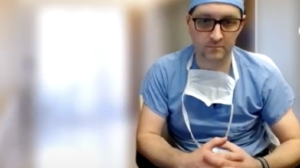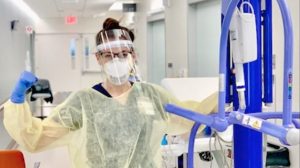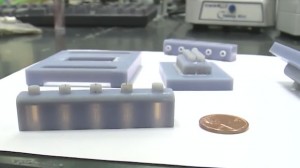NEW YORK (Reuters Health) – A new battery-operated compression device is at least as effective as low-molecular weight heparin in preventing venous thromboembolism (VTE) after hip arthroplasty, but with a lower risk of major bleeding, new research suggests.
As reported in the March 1st issue of The Journal of Bone and Joint Surgery (American Volume), no patient who used the device had major bleeding, whereas 6% of those treated with enoxaparin (Lovenox) did.
The ActiveCare + Synchronized Flow Technology (S.F.T.) system offers several advantages over earlier compression devices, lead author Dr. Clifford W. Colwell, from the Scripps Clinic, La Jolla, California, told Reuters Health.
The device is portable enough for the patient to use after discharge, Dr. Colwell said. Another benefit is that the device “measures blood flow and can synchronize compression with a person’s respirations.” Also, it has “an LCD screen that can track a patient’s compliance.”
Dr. Colwell and his colleagues randomized 410 patients (who had 414 hips replaced) to 10 days of treatment with either ActiveCare+S.F.T. or enoxaparin (30 mg twice daily until discharge, then 40 mg once daily). Patients in the compression device group could take aspirin (81 mg/day) at the discretion of the treating clinician.
The authors screened patients for venous thromboembolism in the calf and thigh with duplex ultrasonography between postoperative days 10 to 12, and again at 12 weeks during a clinical exam.
Distal and proximal deep venous thrombosis rates were 3% and 2%, respectively, in the compression group — not significantly different from the corresponding 3% and 1% rates seen in the enoxaparin group. Rates of pulmonary embolism, as confirmed by spiral CT lung scans, were 1% in each group.
One patient in the compression group with a negative ultrasound exam on day 12 had one deep venous thrombosis and one pulmonary embolism during the 12-week follow-up.
“I think there is going to be a paradigm shift in how we prevent venous thromboembolism,” Dr. Colwell said. “I hope that once these findings come out, it will motivate other companies to produce similar devices.”
The study was funded by Medical Compression Systems, Or Akiva, Israel, which manufactures the ActiveCare+S.F.T. system.
Reference:
J Bone Joint Surg Am 2010;92:527-535.




